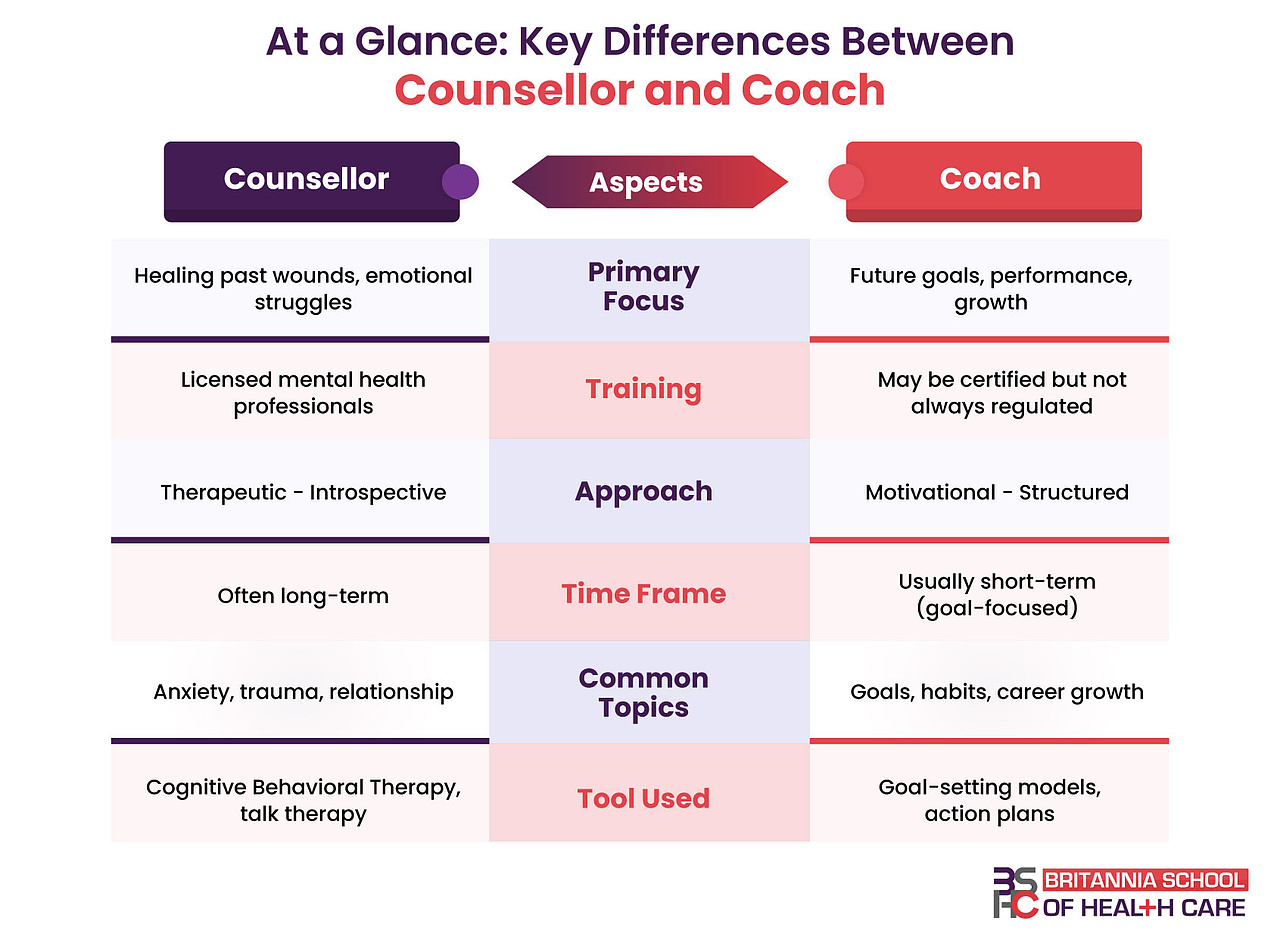In a world where personal and professional challenges are ever-present, many individuals turn to expert guidance for support and direction. Two roles that frequently come up are those of the counsellor and the coach. While they might appear to offer similar services at first glance, their approaches, goals, and areas of expertise differ significantly. Understanding these differences is key to choosing the type of support that best aligns with your needs and aspirations.
Key Takeaways
- Coach: Professional who supports individuals to achieve specific personal or professional goals.
- Counsellor: Trained professional who helps individuals to manage emotional, psychological, or mental health challenges.
What is Counsellor?
A counsellor is a licensed mental health professional trained to help individuals explore emotional issues, process trauma, manage anxiety or depression, and improve psychological well-being.
Counsellors typically hold formal qualifications such as a degree in psychology or counseling and are regulated by professional bodies. Their approach is often therapeutic and past-focused, meaning they help clients uncover root causes of emotional struggles and work toward healing.
What is Coach?
A coach is a trained professional who supports clients in achieving specific goals in areas like personal development, career progression, health, or leadership. Coaching is future-focused and action-oriented, often involving accountability, goal-setting, and strategy.
Unlike counsellors, coaches are not required to have clinical qualifications or licenses, though many pursue certifications through recognised coaching bodies like the ICF (International Coaching Federation).
Understanding the Core Differences
Focus: Healing vs. Growth
- Counsellors help clients explore their emotions, process trauma, and overcome mental health issues.
- Coaches work with people who feel emotionally stable but want to grow, reach goals, or break through barriers.
Approach: Therapy vs. Strategy
- Counsellors use therapeutic methods like CBT and person-centred therapy to explore thought patterns and emotions.
- Coaches use structured tools, future planning, and motivational techniques to drive progress.
Time Frame: Long-Term vs. Short-Term
- Counselling may take months or years depending on the depth of emotional work needed.
- Coaching typically spans 3–12 months, with clearly defined goals and timelines.
Qualifications and Regulation
- Counsellors in the UK usually have a Level 4 Diploma or higher, and are often registered with the BACP or a similar body.
- Coaching is less regulated. However, many coaches complete accredited courses such as the Level 5 Certificate in Coaching for Health and Wellbeing.

🧠 When Should You See a Counsellor?
You may benefit from counselling if you:
✅ Struggle with anxiety, depression, PTSD
✅ Need support processing trauma or grief
✅ Experience relationship or self-esteem issues
✅ Feel emotionally overwhelmed or stuck
Example: You had a difficult upbringing and now struggle with trust in relationships. A counsellor can help unpack and heal those emotional patterns.
🧠 When Should You Hire a Coach?
You may benefit from coaching if you:
✅ Feel stuck or unmotivated in life or work
✅ Want to improve productivity, clarity, or leadership
✅ Need help setting and achieving goals
✅ Seek mindset shifts without emotional distress
Example: You want to switch careers but can’t seem to take the first step. A coach can guide you with strategy and accountability.
Can You Benefit from Both?
Absolutely. Many people find it powerful to use both professionals at different stages:
- Counsellors help you heal what is holding you back.
- Coaches help you move forward and reach new heights.
Think of it like this:
- A counsellor repairs the foundation.
- A coach helps you build the structure above it.
Example: You work with a counsellor to overcome impostor syndrome, then a coach to boost your confidence in public speaking.
🔍 How to Decide What is Right for You?
Ask yourself these key questions:
Am I looking to heal, or grow?
- ➤ Healing → Counsellor
- ➤ Growth → Coach
Do I need to understand my past, or create a plan for my future?
- ➤ Past → Counsellor
- ➤ Future → Coach
Do I feel emotionally distressed, or just directionless?
- ➤ Distressed → Counsellor
- ➤ Unclear/motivated → Coach
Can Someone be Both a Counsellor and a Coach?
Yes, but not at the same time. Dual-trained practitioners can offer clients a seamless transition from emotional healing to personal or professional development. Professionals must clearly define their role to clients. For example, a qualified counsellor may offer coaching services separately but not blend therapeutic work and coaching in the same session. This protects your emotional safety and ensures ethical practice.
Final Thoughts
Both counselling and coaching offer powerful support but they serve different purposes. Ultimately, whether you choose counselling or coaching depends on what you need most at this point in your life. If you are looking to heal from past experiences that are impacting your emotional wellbeing or relationships, a counsellor can provide the support you need. But if your focus is on setting goals, building confidence, and creating a better future, then working with a coach may be the better fit for your journey ahead.

